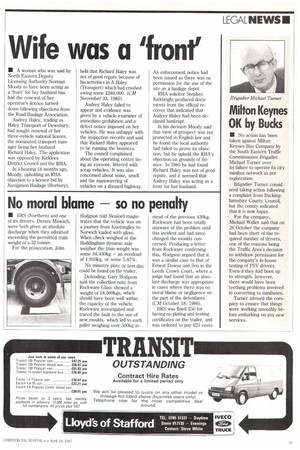No moral blame so no penalty
Page 23

If you've noticed an error in this article please click here to report it so we can fix it.
BRS (Northern) and one of its drivers, Dennis Mawach, were both given an absolute discharge when they admitted exceeding the permitted train weight of a 32 tonner.
For the prosecution, John Hodgson told Sleaford magistrates that the vehicle was on a journey from Knottingley to Norwich loaded with glass. When check weighed at the Hoddingham dynamic axle weigher the train weight was some 34,430kg — an overload of 1,910kg, or some 5.87%.
No ministry plate or test disc could be found on the trailer.
Defending, Gary Hodgson said the collection note from Rockware Glass showed a weight of 18,569kgs, which should have been well within the capacity of the vehicle. Rockware investigated and traced the fault to the use of new moulds, which led to each pallet weighing over 500kg in stead of the previous 420kg. Rockware had been totally unaware of the problem until this incident and had since changed the moulds concerned. Producing a letter from Rockware confirming this, Hodgson argued that it was a similar case to that of Ernest Dowse and Son in the Leeds Crown Court, where a judge had found that an absolute discharge was appropriate in cases where there was no moral blame or negligence on the part of the defendants. (CM October 18, 1986).
BRS was fined 250 for having no plating and testing certificates on the trailer, and was ordered to pay .225 costs.




















































































